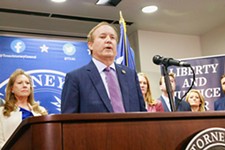Naked City
EA vs. TCTA @ AISD
By Michael King, Fri., Nov. 28, 2003
At AISD, explains human resources director Michael Houser, board policy allows employees to elect one organization to act as their "exclusive voice" in negotiations with the district. Since 1999, Education Austin, with roughly 4,000 members among the district's 10,000 employees, has filled that role. Other organizations can call for an election every four years, and this summer the TCTA as well as the Association of Texas Professional Educators requested the election pending changes in board policy for an "inclusive" negotiation policy that would include all organizations.
The board declined -- most members are on record as supporting the current policy -- but they did amend the policy in order to more broadly share information before and after consultation meetings. Accordingly, ATPE withdrew from the ballot -- telling members it would have preferred broader changes in policy but declined to pursue an expensive district election in a difficult financial year.
But the TCTA stayed on, leaving that small organization (about 300 members, ATPE claims 1,500) in the awkward position of pursuing an election it will inevitably lose. "What am I supposed to do?" asked TCTA President Cynthia Knox. "They tell me I can read the agenda and the minutes of the last meeting? We can't take part unless we join Education Austin. That's just not good enough." EA President Louis Malfaro says the current policy works well and that inviting other organizations into negotiations with the district just invites administrators to exploit differences among the groups.
"This is the most important thing we do," said Malfaro. "It's our 'meet and confer.' We can't represent employees effectively -- and we include all employees, not only teachers -- unless we can speak and act in a unified way."
Knox insists that TCTA offers teachers everything they can get from Education Austin, "except we're cheaper, and our money doesn't go out of state to support strikers somewhere else." The core dispute is philosophical -- TCTA considers itself a "professional organization" while EA functions more like a traditional union. "Collective bargaining is illegal in this state," says Knox, "and if it quacks like a duck, it's probably a duck. It's not my consultation, because I'm not consulted, and my 300 members are not consulted."
Malfaro counters that EA has acted effectively on behalf of all district employees, and that its success in organizing and winning the support of employees confirms its role as the voice of AISD teachers and staff. "We collaborate with other organizations," says Malfaro, "but we act collectively on behalf of our members. They support the current policy, because they understand that in dealing with management, they need solidarity."
Got something to say on the subject? Send a letter to the editor.








